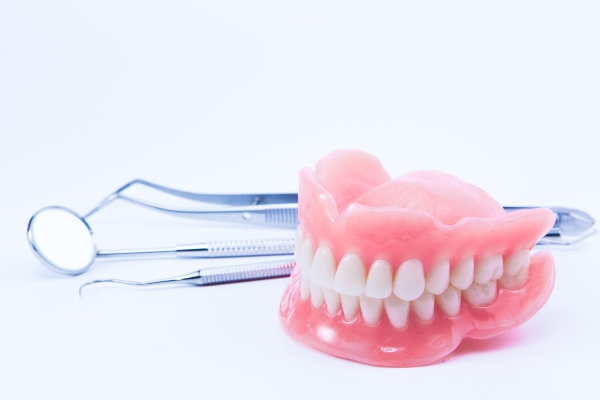Important Care Tips for All-on-4 Implants

An All-on-4® is a type of implant-supported denture that allows you to replace all of your teeth at the same time. It combines many of the benefits of dental implants and dentures, such as the longevity of dental implants. With proper care, All-on-4® implants last longer than removable dentures.
There are two aspects to caring for All-on-4® implants. There is postoperative care following the initial procedure to place the implants and then there is ongoing cleaning and maintenance after the artificial teeth are placed.
Postoperative care during recovery
It takes between three months and six months to recover completely from the All-on-4® implant procedure. This is not only to allow the surgical wounds to heal, which happens more quickly, but also to allow the implants to become completely fused with the jawbone. This has to happen for the implants to be functional and prevent failure. Here are some important steps to take during the recovery process.
Manage side effects
Postoperative swelling and pain are expected after any surgery, and the procedure to place All-on-4® implants is no exception. These are worse within the first 72 hours after your procedure and can be managed with pain medication and cold compresses placed on the sides of the face for 15 minutes at a time. If swelling persists after two to three days, you can switch to moist heat or alternate hot and cold compresses.
Rest
After your procedure, you should take it easy for at least a couple of days, possibly as long as a week. This means taking some time off from work and avoiding any strenuous activity, which could contribute to postsurgical complications. In the worst-case scenario, it could compromise the long-term integrity of your implants.
Modify your diet
You may have a temporary bridge placed following your surgery to maintain the normal appearance of your mouth until you receive your permanent artificial teeth. However, neither the implants nor the artificial teeth are strong enough for you to go immediately back to eating the way you did prior to surgery. During the recovery process, you have to limit yourself to eating soft foods that do not require much chewing.
While you are still healing from the surgery, you may have to limit yourself to liquid foods only for a few days. After that, you should still limit yourself to soft, easy-to-chew foods:
- Soups or stews
- Scrambled eggs
- Applesauce
- Noodles
- Tuna
- Slow-cooked meats
- Mashed potatoes
- Yogurt
Eating fruits and vegetables is a good idea for their nutritional value. Some, such as bananas and avocados, are naturally soft and can be eaten raw, while others may need to be cooked before they are soft enough to eat.
Once your recovery is over and your permanent artificial teeth are placed, you should be able to go back to eating many of the foods that you did before.
Keep your mouth clean
While good oral hygiene is always important, it is especially so when you are healing from surgery to prevent infection. In the first few days following surgery, this may mean rinsing with a special mouthwash because your usual oral hygiene techniques may cause further injury to your surgical wounds. Once you have healed sufficiently, you can go back to brushing and flossing as normal.
Follow your aftercare instructions
Following the procedure, you will be given aftercare instructions. These are specific to your procedure and should be given precedence over all other general instructions.
Ongoing maintenance following recovery
Once you have recovered fully and received your permanent appliance, you can care for your All-on-4® implants in much the same way that you would care for natural teeth, by brushing them at least twice a day and flossing them at least once daily. Your dentist may recommend that you use a certain type of floss designed specifically for implants or that you use a water flosser to clean gently between the artificial teeth. To avoid scratches or other damage, you should use a soft-bristle brush and avoid using toothpaste with harsh abrasives.
You should continue to see your dentist for regular examinations and cleanings after you receive your implants. The dentist can check for any problems affecting your implants or your oral health in general and recommend any necessary treatments.
Conclusion
Failing to care for your All-on-4® implants, especially during the postsurgical recovery period, could put you at risk for failure or other complications. By taking care of your implants, both during recovery and after, you may be able to avoid complications and help your implants last longer.
Request an appointment here: https://www.casasadobesdentistry.com or call Casas Adobes Dentistry at (520) 365-0559 for an appointment in our Tucson office.
Check out what others are saying about our dental services on Google: All-on-4 Dental Implants in Tucson, AZ.
Recent Posts
If you are researching replacement options for missing teeth, then you will most likely come across All-on-4®. The All-on-4 treatment is a type of implant denture for replacing a complete dental arch. In this article, you will learn about the purpose of the system, how it works and what to expect.All-on-4 is an innovative method…
All-on-4® is becoming a highly popular choice for teeth replacement among individuals who need to replace all or most of their teeth on a specific row. The All-on-4 technique optimizes the dental implants process for those who need full arch replacement to minimize the invasiveness, cost, and time that it takes to complete the process.The…
Patients with pervasive tooth loss can choose All-on-4® implants as an alternative to standard implants or traditional dentures for replacing entire sets of upper and lower teeth. This prosthodontic procedure is gaining popularity among dental patients for the following reasons: Only four implants support one full upper or one full lower set of teeth Teeth…
All-on-4 is® a type of implant-supported dentures. They are usually recommended when a patient has lost most or all of the teeth on their upper or lower jaw. One of the main causes of tooth loss is gum disease. While it is treatable, the longer one goes without treatment, the more they are putting their…


